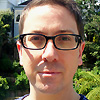Chris Bourke interview - Page 5
Chris: Incidental Pieces- writing for theatre.
Douglas: Oh, marvellous experience writing for Ngaio Marsh and her Shakespeare productions, you learnt a tremendous amount about pace and form.
Chris: Always have to think of your listener.
Douglas: Like any professional work of that kind - radio productions or commercials even - you have to say what you mean precisely in 29 seconds, neither more nor less - a very good discipline.
Chris: The reason so prolific after war - people to play string pieces, theatre, national orchestra.
Douglas: I think I was writing a great deal between say 1942 when I settled back in Christchurch and 1947 when I first came up to Wellington to teach partly because I had a great deal of time to myself.
Chris: For income.
Douglas: I used to do some Press criticism, I'd take any student who turned up at my doorstep, I did some arranging for the Broadcasting library and derived a bit of income from my theatre productions … and I had the prize money to fall back on. I even worked on the wharves, briefly! But one could live very simply in a single room, brewed my own beer and cooked on a gas ring … one just existed.
Chris: Creative world in Christchurch at that time often mentioned.
Douglas: It was a very enlivening place at that time. It used to be the proud boast of the Christchurch Press for instance that it was not in the hands of journalists … if you imagine from John Schroder the literary editor through people like Allen Curnow, Walter Brookes, Stephen McElraith, Julian Deans and Carl Straubel, about a dozen, whose names were familiar through their publications and so it was an enthralling paper. And at the Caxton Press was Denis Glover, Leo Bensemann, as a focal point. So it was a lucky context to be dropped into, there was nothing else like it in the country apart from the North Shore in Auckland.
Chris: And that's the [Frank] Sargeson school.
Douglas: Yes, and Fairburn.
Chris: Apart from yourself, what was going on musically.
Douglas: The Canterbury Graduate Composers Society [with amusement] they were called…please don't quote me.
Chris: Support.
Douglas: Well, they believed in what I was doing, in the same way that I believed in what they were doing, poets like Allen Curnow, painters like Rita Angus.
Chris: All the arts mixed, was only encouragement you could get.
Douglas: From peers? Very few cared … but one was lucky to have anybody at all. Another factor of course was the European people who came out here at the time of the war - what they called the refugees - these were highly civilised people who became part of society. I think they were the first people who made me feel that I should be proud of being a composer.
Chris: Before that.
Douglas: [Giggle] One was living in a slightly hostile world. They could be sometimes, yes. I can't define it, but what the poet [R.A.K.] Mason called that "far pitched perilous and hostile place" … though nobody was really sure whether he was talking about New Zealand or the earth and the universe. I suppose in the sense that one had a good context... These artistic people were new in various fields, but there was very little apart from that. So you used to sustain each other, rather than be sustained by society. But it's a bit difficult for me to generalise like that. I've never thought about it very clearly.
Chris: Teaching slowed down output.
Douglas: It meant that one had to work damn hard. On the other hand I was getting more stimulus from students and meeting a younger group of composers at the Cambridge Summer School. I did a lot of commission work at the time though, for the Film Unit and Broadcasting. If anything had to be reduced, it was social life. Weekends, evenings, were used for work.









